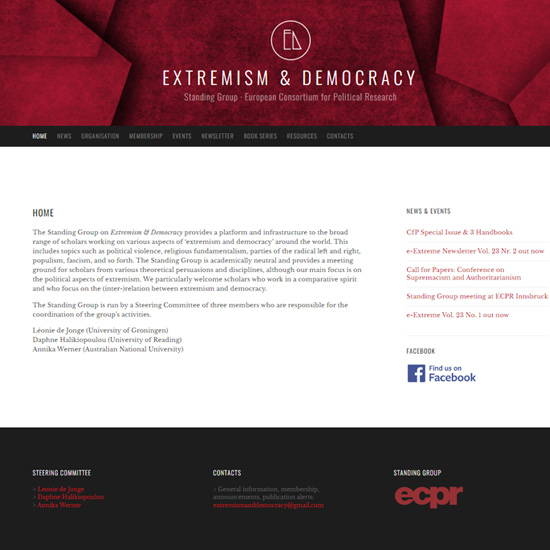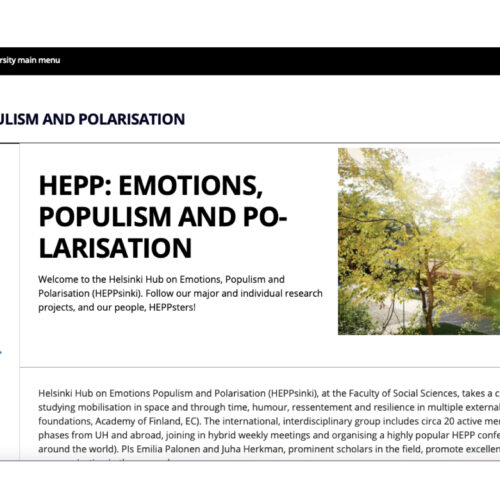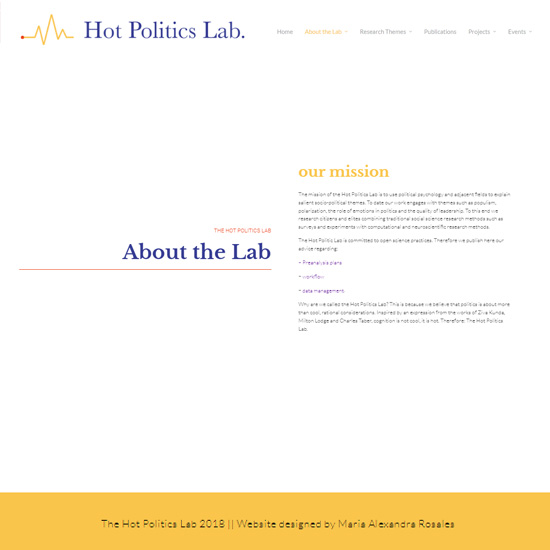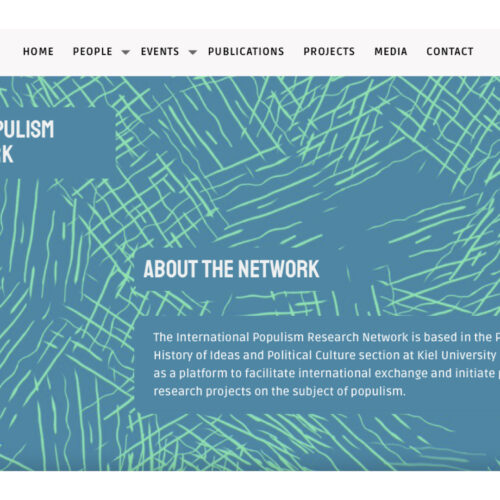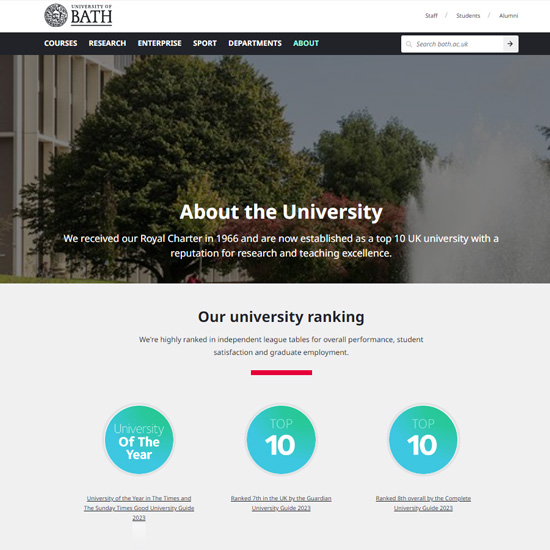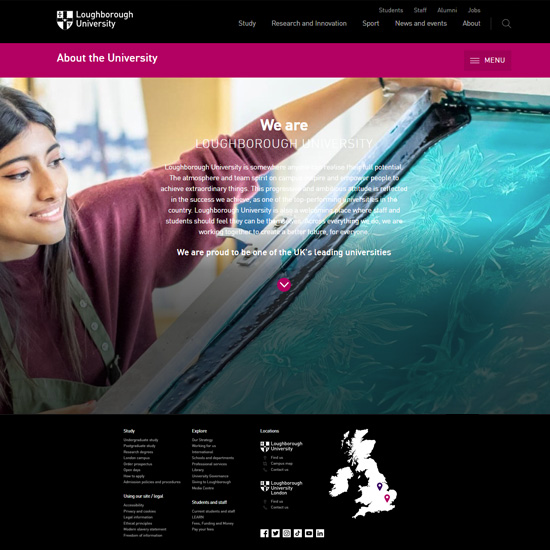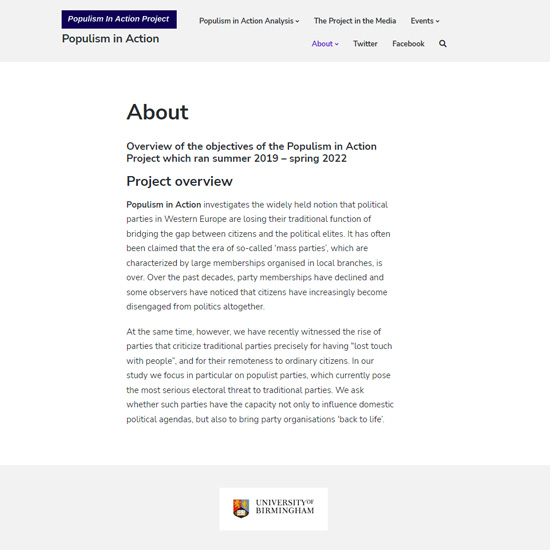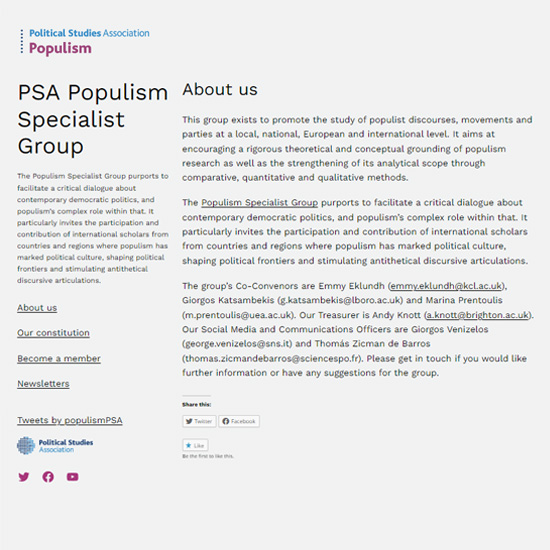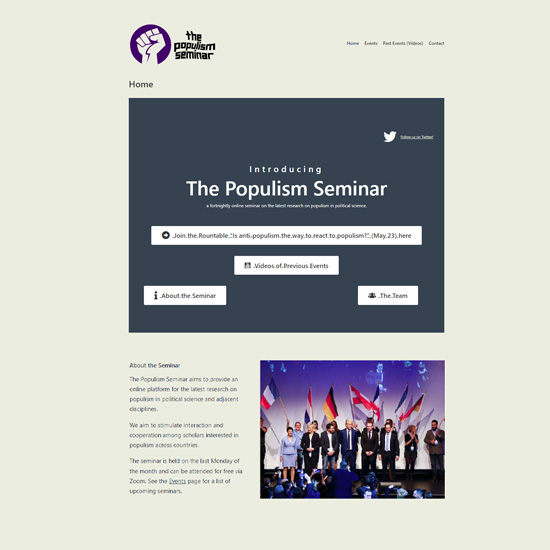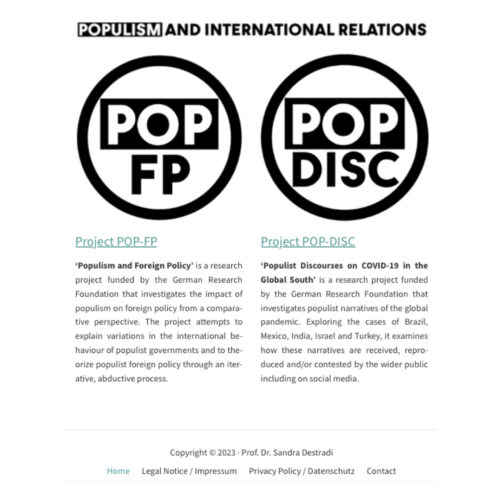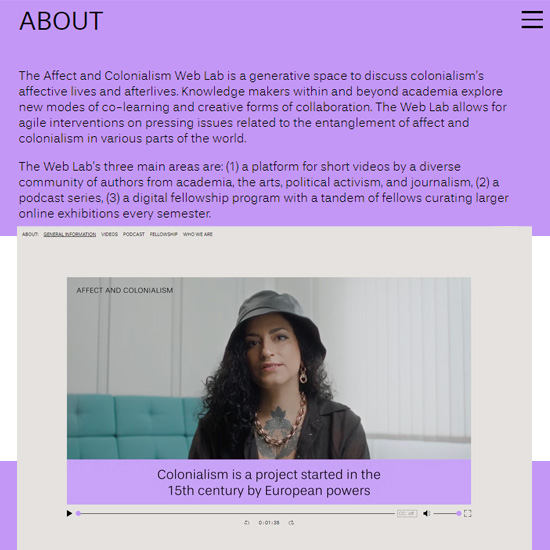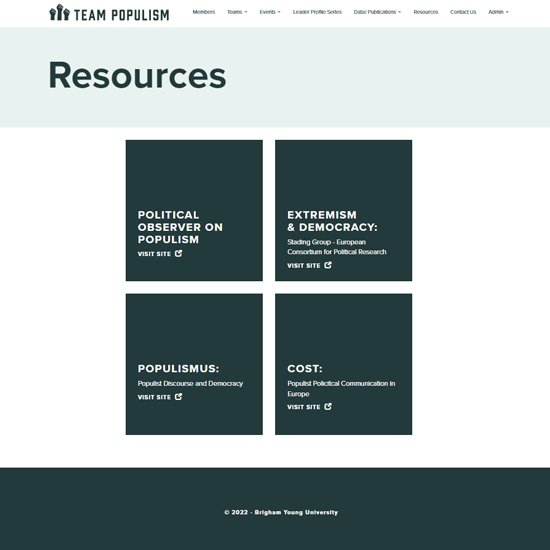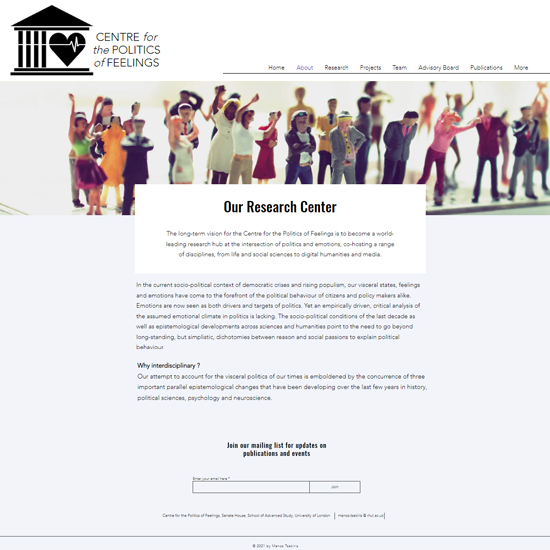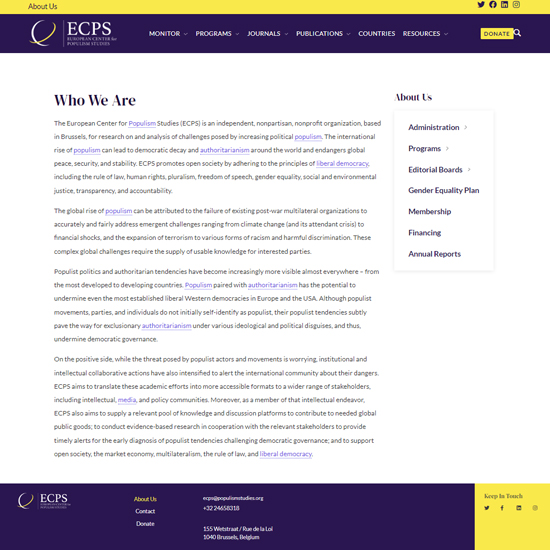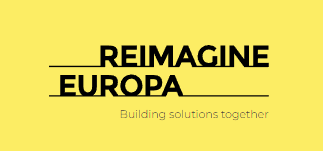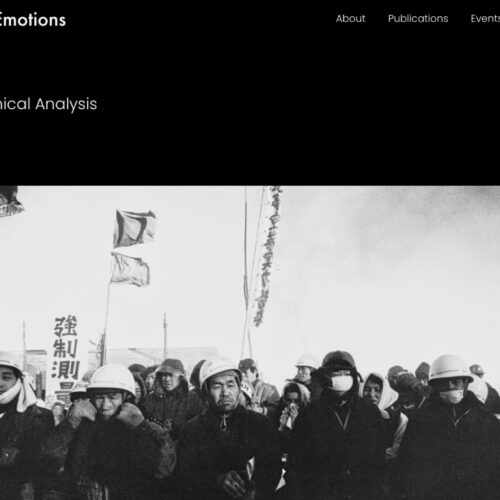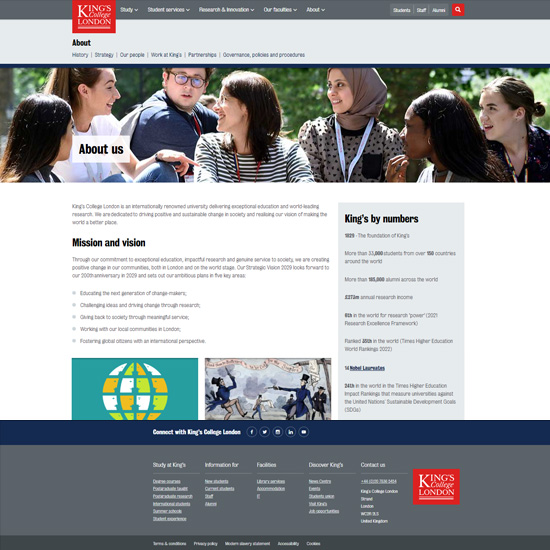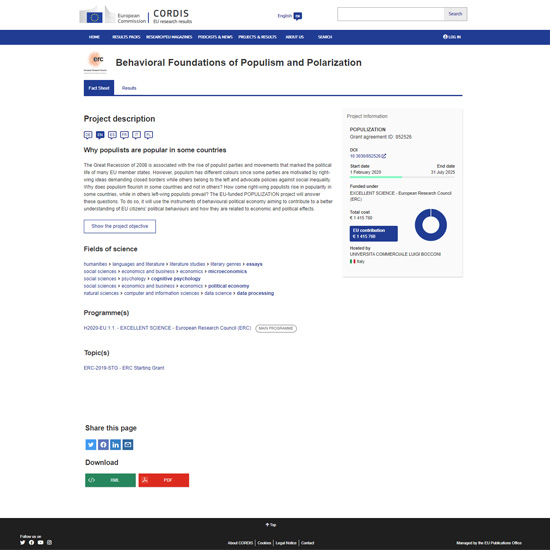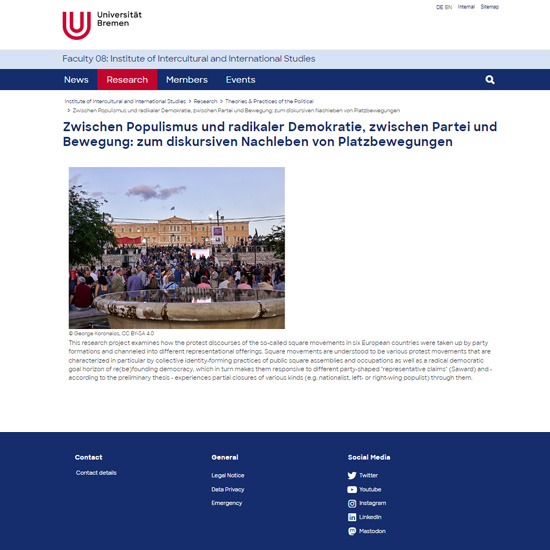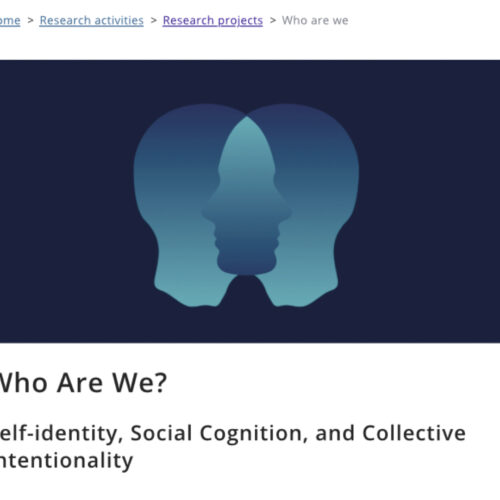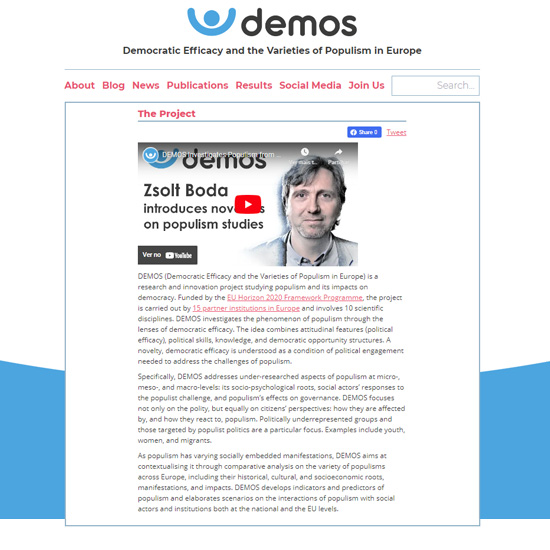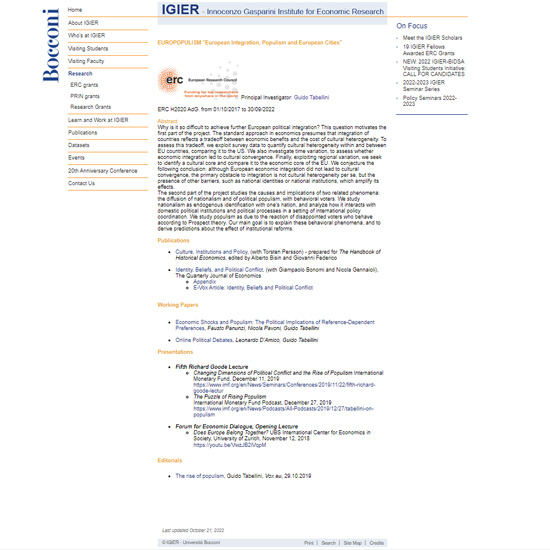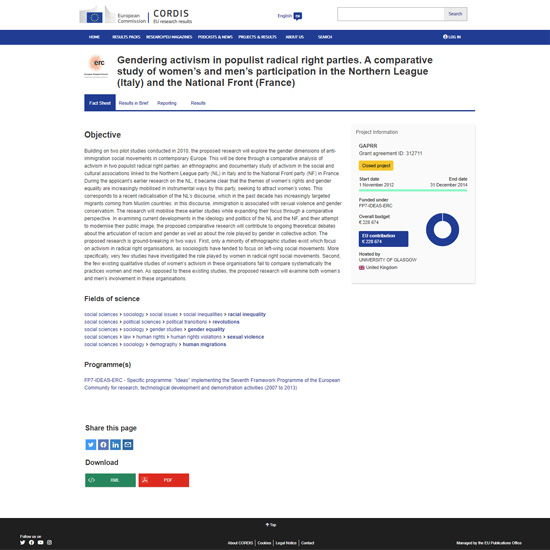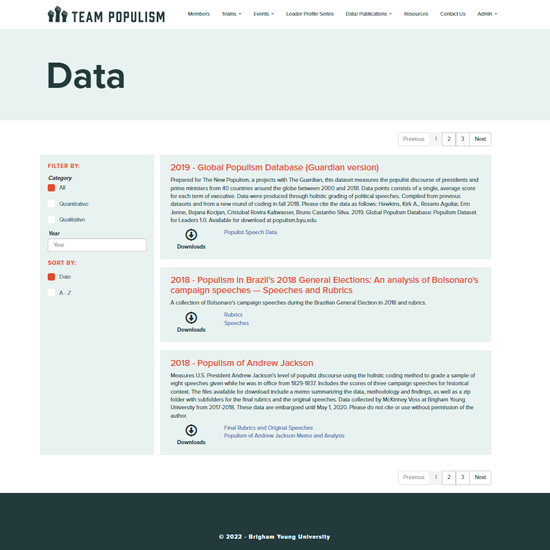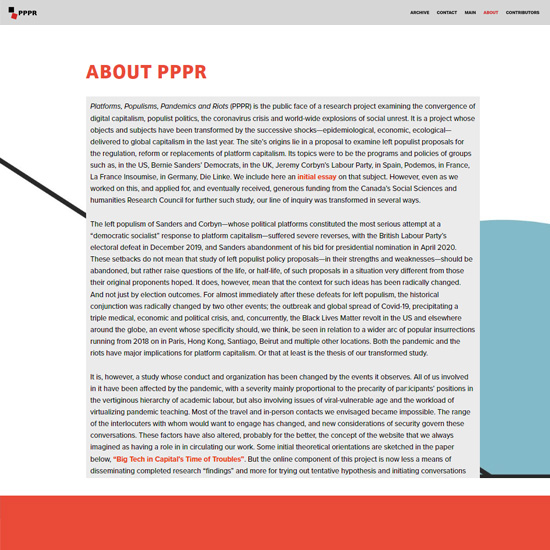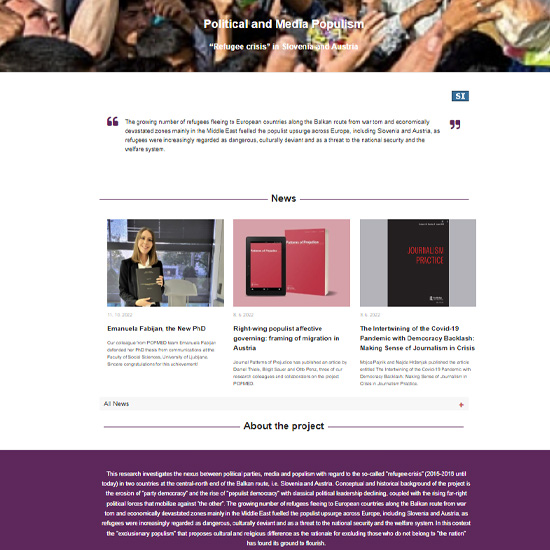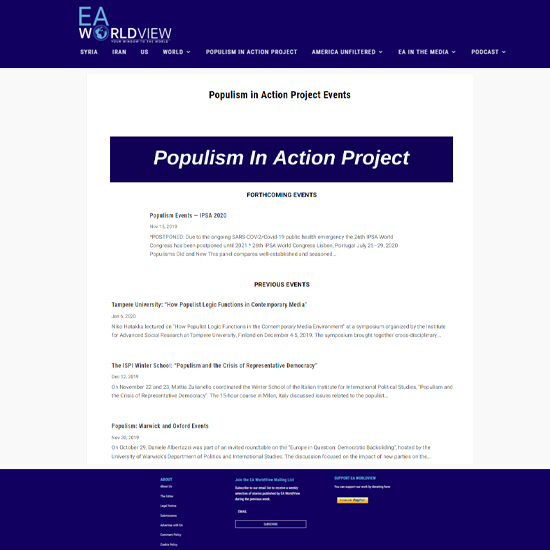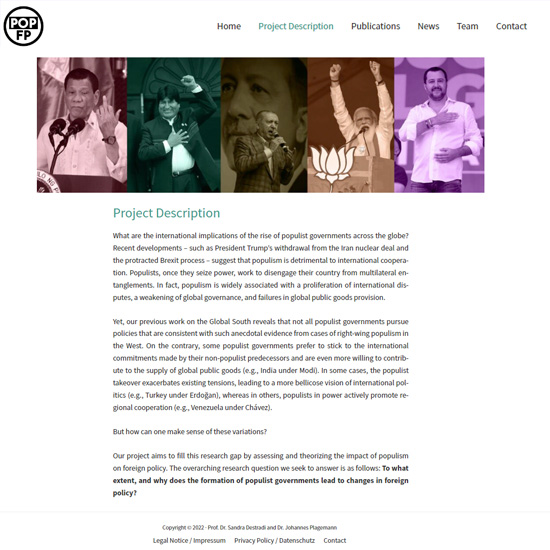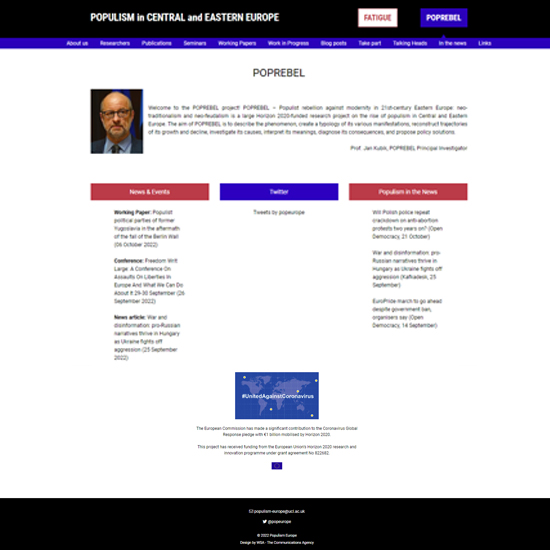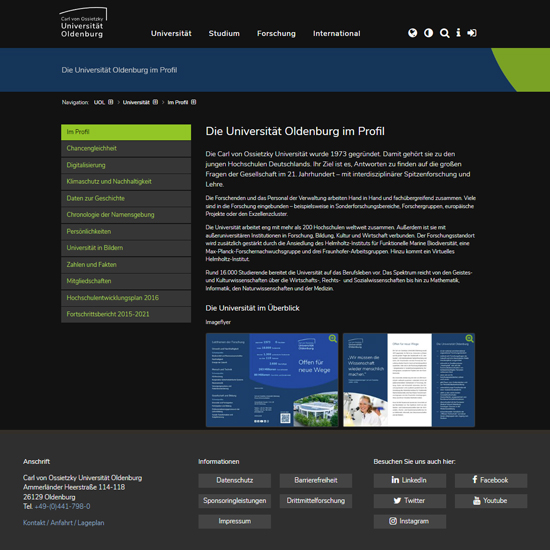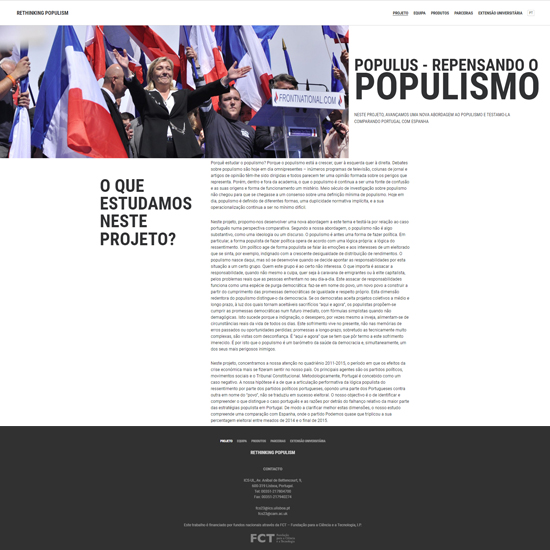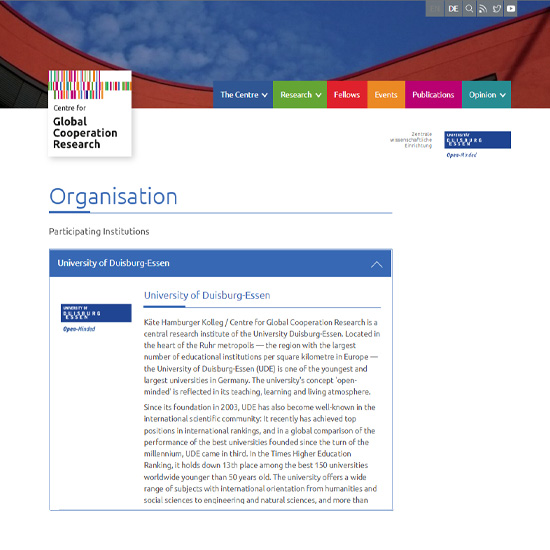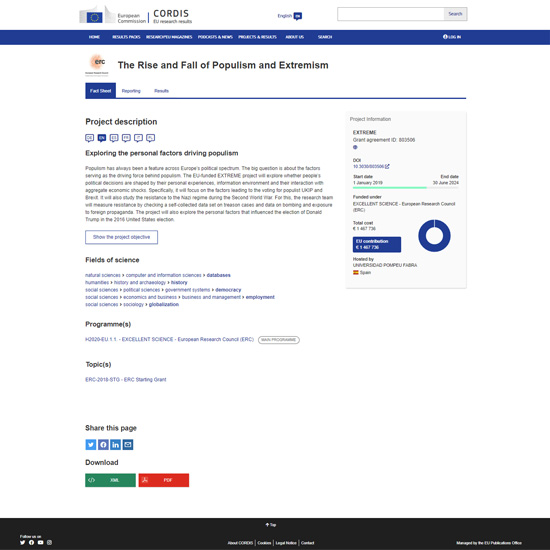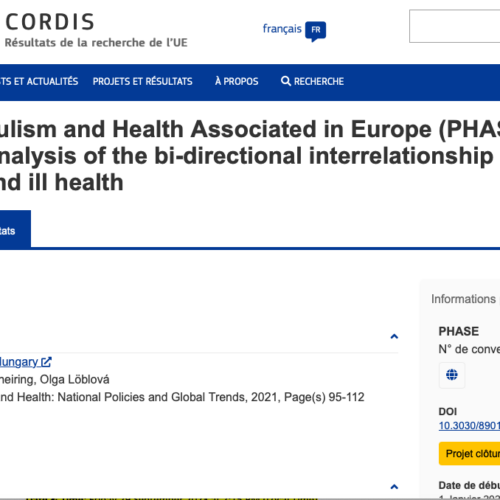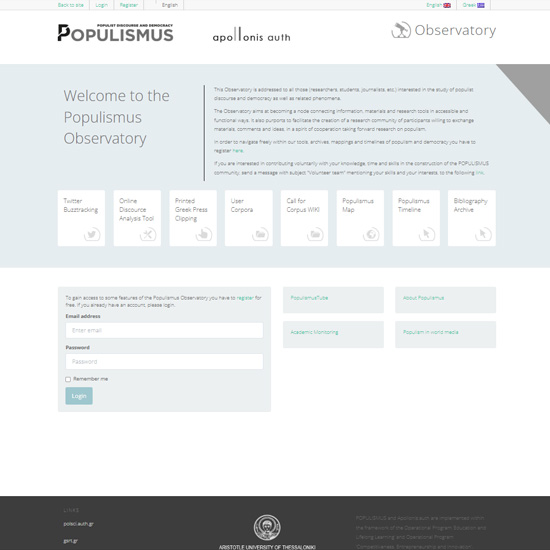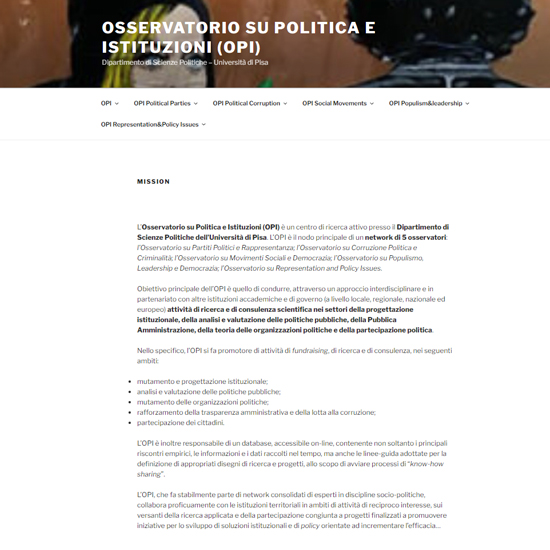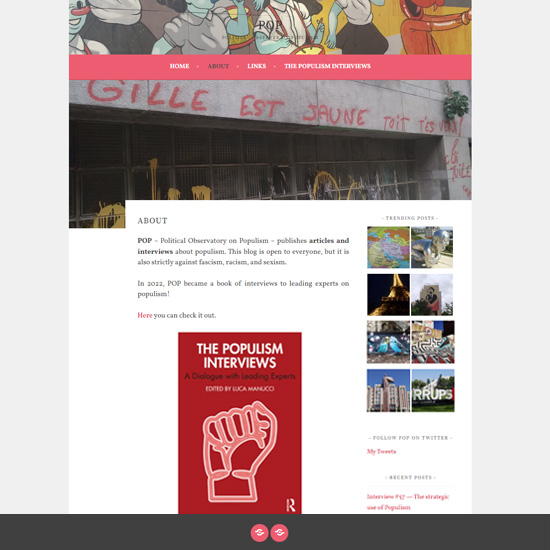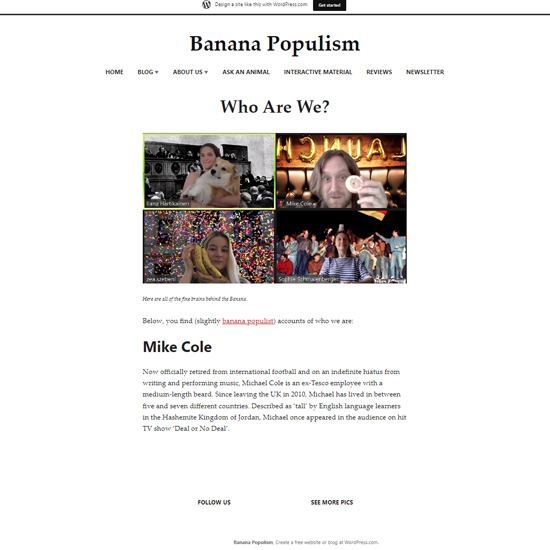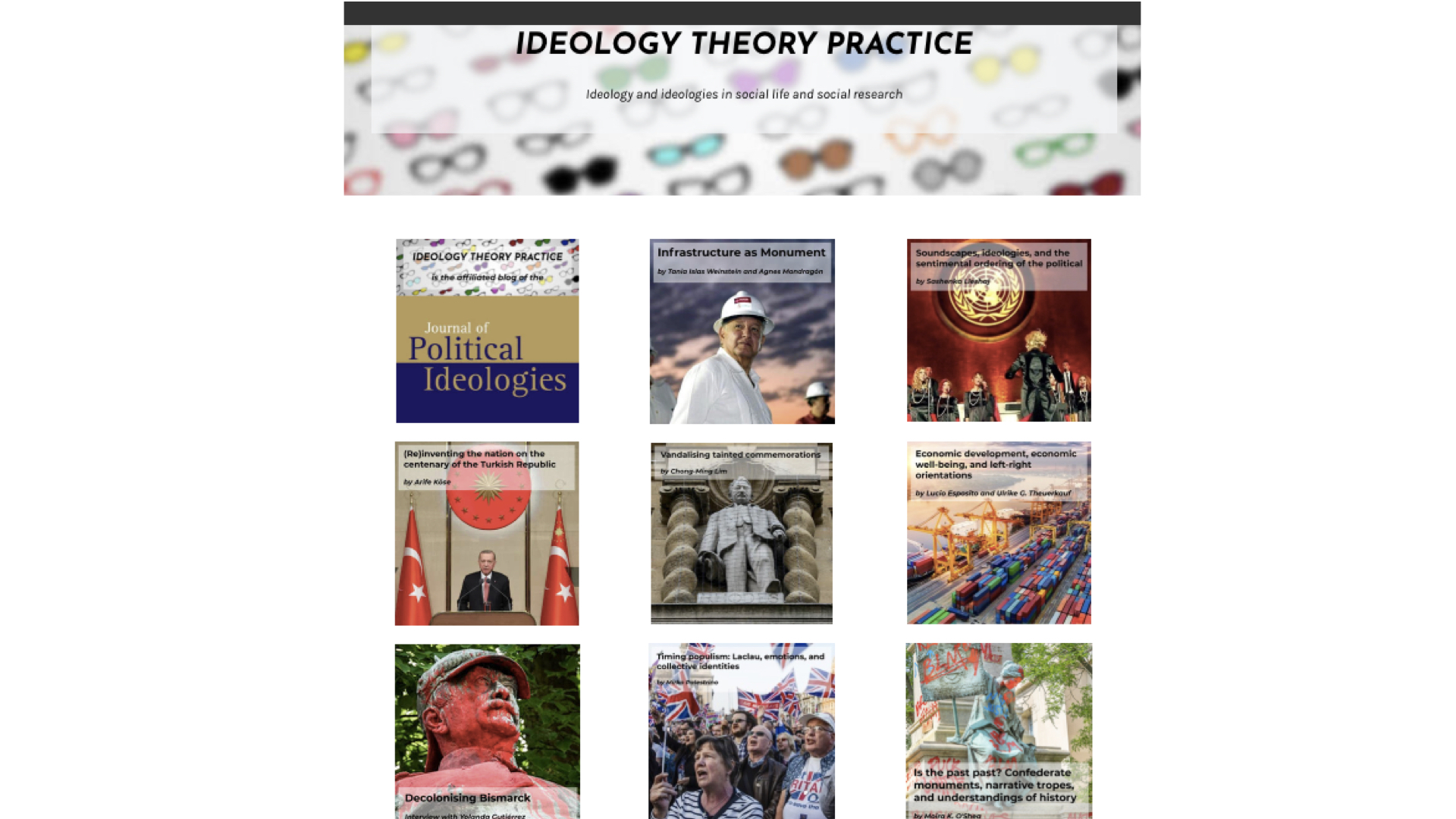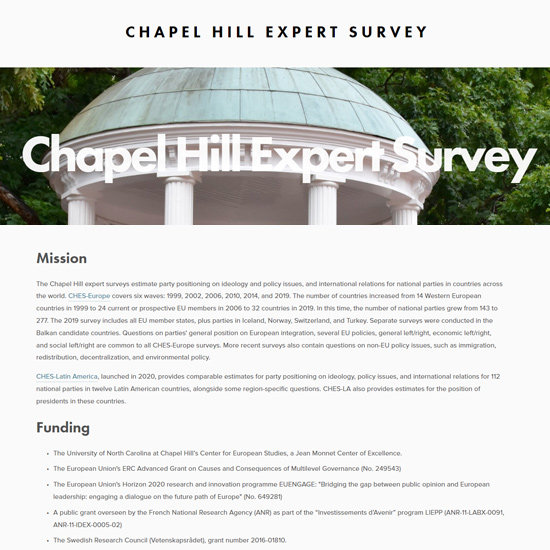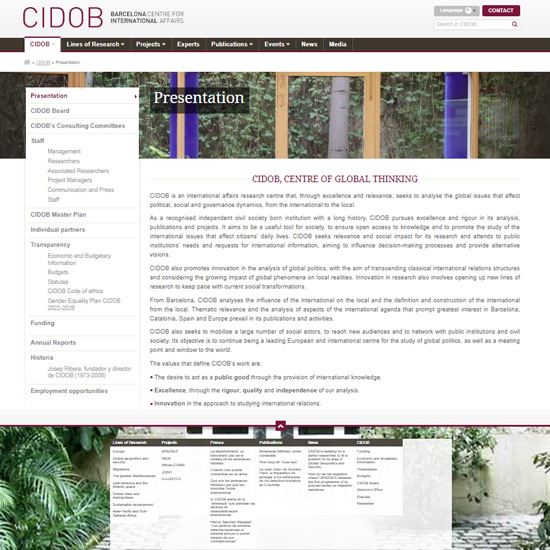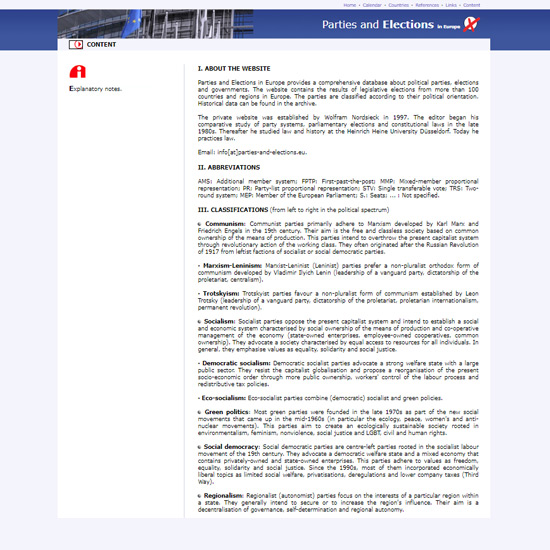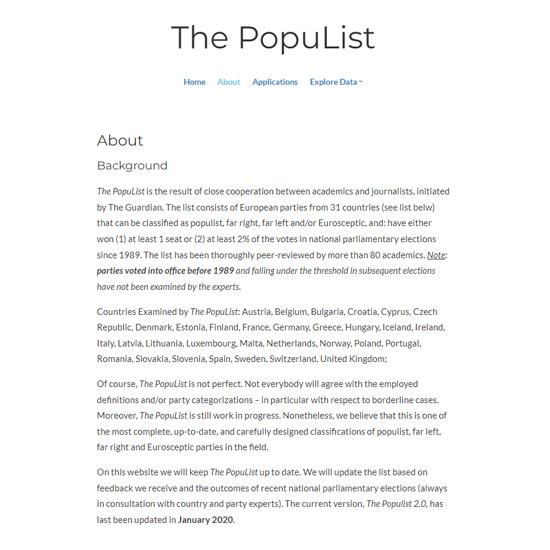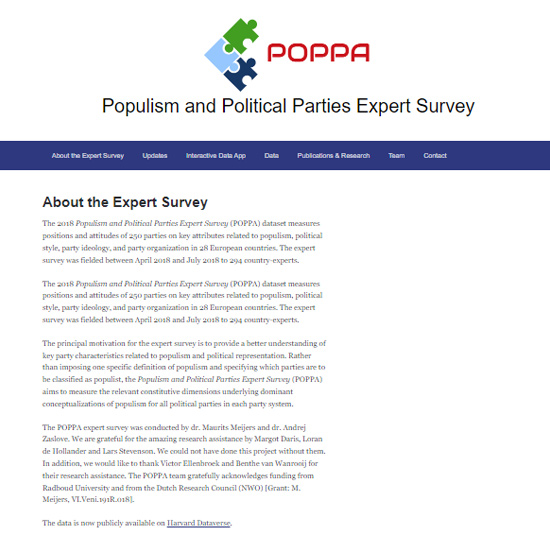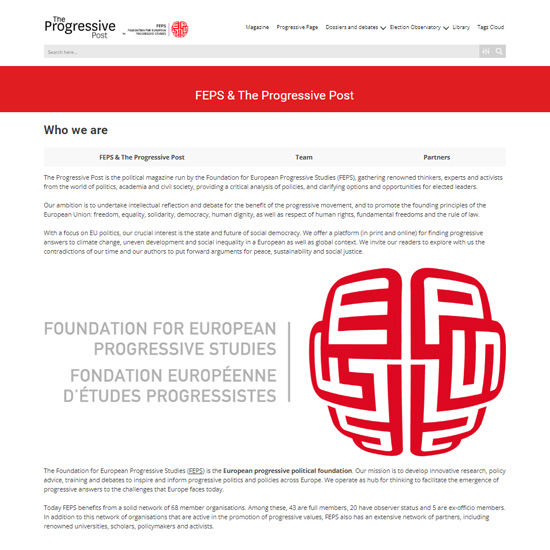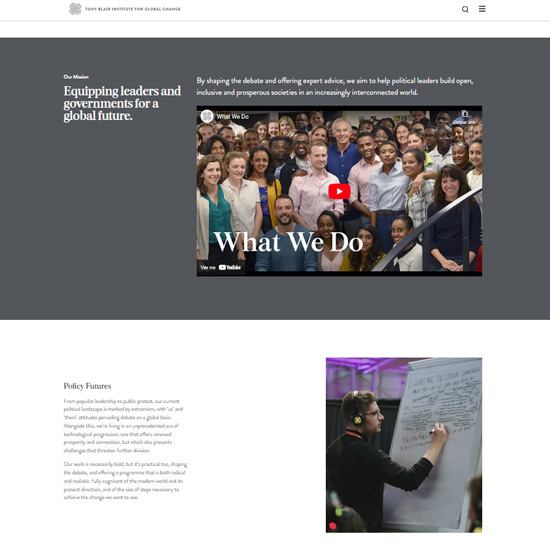The Standing Group on Extremism & Democracy provides a platform and infrastructure to the broad range of scholars working on various aspects of ‘extremism and democracy’ around the world. This includes topics such as political violence, religious fundamentalism, parties of the radical left and right, populism, fascism, and so forth. The Standing Group is academically neutral and provides a meeting ground for scholars from various theoretical persuasions and disciplines, although our main focus is on the political aspects of extremism. We particularly welcome scholars who work in a comparative spirit and who focus on the (inter-)relation between extremism and democracy.
Mapping
Extremism & Democracy (ECPR Standing Group)
Caterina Froio (Sciences Po)
Andrea L. P. Pirro (Scuola Normale Superiore)
Stijn van Kessel (Queen Mary University of London)
extremismanddemocracy@gmail.com
Helsinki Hub on Emotions, Populism and Polarisation (HEPP)
HEPP is currently composed of three nationally funded research projects that explore populism, polarisation and affects from several angles. They focus on political parties and mainstreaming of populist discourses (MAPO), role of the media and the transforming hegemonic processes (WhiKnow), the physical and online landscapes and history building (NTUS), and (de)radicalisation also in the urban participatory and local democracy context (D.Rad).
Emilia Palonen
emilia.palonen@helsinki.fiChristine Unrau
Hot Politics Lab
The Hot Politics Lab is an interdisciplinary research group using political psychology and adjacent fields to explain salient socio-political themes.
Bert N. Bakker
b.n.bakker@uva.nl
Matthijs Rooduijn
m.rooduijn@uva.nl
Gijs Schumacher
g.schumacher@uva.nl
International Populism Research Network
The International Populism Research Network is based in the Political Theory, History of Ideas and Political Culture section at Kiel University (CAU Kiel). It serves as a platform to facilitate international exchange and initiate publication and research projects on the subject of populism.
Prof. Dr. Paula Diehl (Director)
contact.populism@politik.uni-kiel.de
Mainstreaming Populism in the 21st Century (MAPO)
Mainstreaming Populism in the 21st Century explores different forms of mainstreaming of populism in Europe and the Americas in the 21st century. The project will analyse how populist parties have become part of the mainstream, how other parties have coloured their policies increasingly with a populist streak and how different mainstreaming forms of populism have transformed public debate, the media and democracy in various polities. It was funded by the Academy of Finland (2017-2021). It is based on collaboration between media and communication studies, as well as political science and political theory researchers at the universities of Helsinki, Jyväskylä and Turku.
Juha Herkman (Academy of Finland research fellow and a Senior Lecturer in Communication Studies)
Juha.herkman(at)helsinki.fi
Nationalism, Populism and Radicalism
Our research addresses social and political phenomena associated with nationalism, populism, and radicalism. Nationalism and populism intersect in movements or conflicts over a sovereign people. Studies of nationalism focus on ethnic conflict, ethnic parties and power-sharing, separatism, patriotism and legitimation. Research on populism and radicalism addresses far right and radical left parties, neofascism, illiberal democracy, racism, nativism, islamophobia, xenophobia, and Euroscepticism.
Dr Paul Goode
j.p.goode@bath.ac.uk
Populism Research Group (PRG)
The Populism Research Group (PRG) at Loughborough University was established in 2018 and aspires to build a dynamic School-wide intellectual community for Postgraduate Researchers (PGRs) and members of staff working on different aspects of the populist phenomenon.
Panos Panayotu
p.panagiotou2@lboro.ac.uk
Populism in Action
Populism in Action is a research group, linked to the Populism in Action project using in-depth case studies of populist right party organisations.
populism@contacts.bham.ac.uk
Populism Specialist Group (PSA)
The Populism Specialist Group purports to facilitate a critical dialogue about contemporary democratic politics, and populism’s complex role within that. It particularly invites the participation and contribution of international scholars from countries and regions where populism has marked political culture, shaping political frontiers and stimulating antithetical discursive articulations.
Dr. Giorgos Venizelos
george.venizelos@sns.it
Dr. Thomás Zicman de Barros
thomas.zicmandebarros@sciencespo.fr
Dr. George Newth
ghn20@bath.ac.uk
Dr. Lone Sorensen
L.N.Sorensen@leeds.ac.uk
Dr. Juan Roch González
juan.roch@uam.es
Dr. Theo Aiolfi
theo.aiolfi@cyu.fr
Populism Seminar
Populism in Action is a research group, linked to the Populism in Action project using in-depth case studies of populist right party organisations.
Dr. Annika Werner (ASSOCIATE PROFESSOR, Australian National University)
https://annikawerner.com/
populism@contacts.bham.ac.uk
Populism and International Relations
The project is structured in two Work Packages (WPs). WP1 takes stock of changes in foreign policy after the formation of populist governments by comparing the foreign policies of each populist government with that of its non-populist predecessor (within-case comparison) across the four fields (a-d). WP1 also addresses shifts in the processes of foreign policy-making in each case. WP2 answers the second part of the research question (‘why?’). It compares foreign policy change after populist government formation across cases. It uses such comparison for theory-building by taking an abductive approach and develops, assesses, and refines theoretical expectations about the mechanisms through which populism impacts foreign policy.
Prof. Dr. Sandra Destradi
sandra.destradi@politik.uni-freiburg.de
Dr. Julia Gurol; Dr. Johannes Plagemann
julia.gurol@politik.uni-freiburg.de;
johannes.plagemann@giga-hamburg.de
The Affect and Colonialism Web Lab
The Affect and Colonialism Web Lab brings together researchers, journalists, activists, and artists all over the world interested in the affective dynamics of colonialism.
Débora Medeiros (Freie Universität Berlin)
info@aac-weblab.net
Team Populism
Team Populism brings together renowned scholars from Europe and the Americas to study the causes and consequences of populism.
Kirk A. Hawkins (Director)
kirk.hawkins@byu.edu
Alyssa Doig (Administrative Assistant)
teampopulism@byu.edu
RESEARCH CENTER
Center for Research on Extremism (C-REX)
The Extreme Right, Hate Crime, and Political Violence
The Center for Research on Extremism, C-REX, is a cross-disciplinary center for the study of right-wing extremism, hate crime and political violence. It is a joint collaboration with six of the leading Norwegian institutions on extremism research.
Tore Bjørgo
tore.bjorgo(at)c-rex.uio.no
Centre for the Politics of Feelings
The Centre for the Politics of Feelings is devoted to the interdisciplinary understanding of how emotions and feelings can be active causes but also targets of political behaviour in diverse socio-political contexts. The Centre will address from a multi-disciplinary perspective, how affect and emotions and their underlying neurophysiological mechanisms shape political behaviour in intricate couplings with rationality, as well as how politics shapes and exploits affect and emotions. The Centre represents a focused, timely and multidisciplinary endeavour to give a new answer to an age-old question: What does it mean to be a political animal in the 21st century of ’emo-cratic’ politics, alternative facts, social media, precarious health and populism?
Manos Tsakiris
manos.tsakiris@rhul.ac.uk
DESIRE
Center for the Study of Democracy, Signification and Resistance
DESIRE performs critical academic research into the political-democratic nature of societal processes and their discursive-significatory dimensions.
Crucial within DESIRE’s remit is the study of the logics of power. How are power strategies developed and resisted? And how does signification intervene in these power logics? This focus is grounded in the idea that processes of signification are highly political because they define our realities in always particular ways. Processes of signification sometimes result in hegemonic orders, sometimes in highly instable struggles of contestation and resistance. DESIRE’s focus on the discursive-significatory is always grounded in contextualising reflections on the material, the structural, affect and agency.
DESIRE’s focus is on the political, broadly defined as the ontological dimension of struggle and conflict in society, and therefore not restricted to specific institutionalised forms of politics. DESIRE studies the many societal fields where meaning is produced and circulated, including the media sphere, the sphere of cultural institutions and heritage sites, and the sphere of politics.
Benjamin De Cleen
benjamin.de.cleen@vub.be
European Center for Populism Studies (ECPS)
The European Center for Populism Studies (ECPS) is an independent, nonpartisan, nonprofit organization, based in Brussels, for research on and analysis of challenges posed by increasing political populism. The international rise of populism can lead to democratic decay and authoritarianism around the world and endangers global peace, security, and stability. ECPS promotes open society by adhering to the principles of liberal democracy, including the rule of law, human rights, pluralism, freedom of speech, gender equality, social and enviromental justice, transparency, and accountability.
Sir Graham Watson
ecps(at)populismstudies.org
info@populismstudies.org
ORGANIZATIONS (e.g., NGOs and think/tanks)
Hope not Hate
The UK’s leading anti fascism & anti racism campaign group.
Telephone +44 (0)207 952 1181
Reimagining Europa
Building Solutions Together
events@re-imagine.eu
press@re-imagine.eu.
Generic mail contact: hello@re-imagine.eu
Email: secretariat@re-imagine.eu
Antagonistic Political Emotions
(Center for Subjectivity Research, University of Copenhagen)
This project investigates what it means to experience political emotions, provide detailed analyses of specifically antagonistic political emotions, clarify their role in political identification and group formation, consider their normative functions and appropriateness conditions, and examine how they arise in face-to-face encounters, social movements, as well as online contexts.
thomas.szanto@hum.ku.dk;
rrt@hum.ku.dk;
lucy.osler@hum.ku.dk
Authoritarianism and populism research group
The group is dedicated to increasing our understanding of the rise of populism and the deepening of authoritarianism around the world. It will create synergies across departments and institutes at King’s as well as partner with other academic centres working on these issues around the world.
Anthony Pereira
anthony.pereira@kcl.ac.uk
Behavioral Foundations of Populism and Polarization
The Great Recession of 2008 is associated with the rise of populist parties and movements that marked the political life of many EU member states. However, populism has different colours since some parties are motivated by right-wing ideas demanding closed borders while others belong to the left and advocate policies against social inequality. Why does populism flourish in some countries and not in others? How come right-wing populists rise in popularity in some countries, while in others left-wing populists prevail? The EU-funded POPULIZATION project will answer these questions. To do so, it will use the instruments of behavioural political economy aiming to contribute to a better understanding of EU citizens’ political behaviours and how they are related to economic and political effects.
Salvatori Nunnari
salvatore.nunnari@unibocconi.it
Between populism and radical democracy, between party and movement: on the discursive afterlife of square movements
This research project investigates how the protest discourses of the so-called square movements in six European countries were taken up by party formations and channeled into different representation offers. Square movements are understood to mean various protest movements, which are characterized in particular by collective identity-forming practices of public square assemblies and occupations as well as a radical democratic target horizon of the re-founding of democracy, which in turn makes them accessible to different party-shaped “representative claims” (Saward) and – according to the preliminary thesis – through this partial closure of different kinds (e.g. nationalist, left- or right-wing populist). The aim of the research is a typology of party-shaped “representative claims” that bridges the different terminology of radical theories of democracy and populism on the one hand and party and movement research on the other hand by conceptualizing the representation offers both discourse-theoretically and organizationally-typical.
Dr. Kim Seongcheol
seongcheol.kim@uni-bremen.de
Center for Subjectivity Research, University of Copenhagen
The project investigates what it means to feel, think, and act as part of a we. Its guiding hypothesis is that a systematic account of the we must be embedded in a more comprehensive investigation of selfhood and social cognition.
Professor Dan Zahavi
zahavi@hum.ku.dk
Democratic Efficacy and the Varieties of Populism in Europe (DEMOS)
Democratic Efficacy and the Varieties of Populism in Europe
DEMOS (Democratic Efficacy and the Varieties of Populism in Europe) is a research and innovation project studying populism and its impacts on democracy.DEMOS investigates the phenomenon of populism through the lenses of democratic efficacy. The idea combines attitudinal features (political efficacy), political skills, knowledge, and democratic opportunity structures. A novelty, democratic efficacy is understood as a condition of political engagement needed to address the challenges of populism.
Guiliano Bobba
giuliano.bobba@unito.it
A.H.Fischer
a.h.fischer@uva.nl
European Integration, Populism and European Cities
The Great Recession of 2008 is associated with the rise of populist parties and movements that marked the political life of many EU member states. However, populism has different colours since some parties are motivated by right-wing ideas demanding closed borders while others belong to the left and advocate policies against social inequality. Why does populism flourish in some countries and not in others? How come right-wing populists rise in popularity in some countries, while in others left-wing populists prevail? The EU-funded POPULIZATION project will answer these questions. To do so, it will use the instruments of behavioural political economy aiming to contribute to a better understanding of EU citizens’ political behaviours and how they are related to economic and political effects.
Guido Tabelini
guido.tabellini@unibocconi.it
FATIGUE - Delayed Transformational Fatigue in Central and Eastern Europe
The aim of FATIGUE is to develop theoretically and empirically robust explanations for the causes and consequences of rise of illiberalism and authoritarianism in post-communist Europe (and Europe, more generally) with reference to the concept of ‘delayed transformational fatigue’.
Richard Mole
populism-europe@ucl.ac.uk
Gendering activism in populist radical right parties
A comparative study of women’s and men’s participation in the Northern League (Italy) and the National Front (France)
Building on two pilot studies conducted in 2010, the proposed research will explore the gender dimensions of anti-immigration social movements in contemporary Europe. This will be done through a comparative analysis of activism in two populist radical right parties: an ethnographic and documentary study of activism in the social and cultural associations linked to the Northern League party (NL) in Italy and to the National Front party (NF) in France. During the applicant’s earlier research on the NL, it became clear that the themes of women’s rights and gender equality are increasingly mobilised in instrumental ways by this party, seeking to attract women’s votes. This corresponds to a recent radicalisation of the NL’s discourse, which in the past decade has increasingly targeted migrants coming from Muslim countries: in this discourse, immigration is associated with sexual violence and gender conservatism. The research will mobilise these earlier studies while expanding their focus through a comparative perspective. In examining current developments in the ideology and politics of the NL and the NF, and their attempt to modernise their public image, the proposed comparative research will contribute to ongoing theoretical debates about the articulation of racism and gender as well as about the role played by gender in collective action. The proposed research is ground-breaking in two ways. First, only a minority of ethnographic studies exist which focus on activism in radical right organisations, as sociologists have tended to focus on left-wing social movements. More specifically, very few studies have investigated the role played by women in radical right social movements. Second, the few existing qualitative studies of women’s activism in these organisations fail to compare systematically the practices women and men. As opposed to these existing studies, the proposed research will examine both women’s and men’s involvement in these organisations.
Francesca. Scrinzi
francesca.scrinzi@glasgow.ac.uk
PACT: Populism and Conspiracy Theory
The ERC-funded project “Populism and Conspiracy Theory (PACT)” investigates the significance of conspiracy theories for populist movements in four European countries and two in the Americas. The project is scheduled to run until March 2025. The PI, Michael Butter, and his team (one postdoc and four PhD students) will employ a combination of discourse analysis and ethnographic methods to study the connections between populism and conspiracy theories in online and offline discourses in Austria, Hungary, Italy, Poland, Brazil and the United States. Michael Butter will focus on right- and left-wing populism during the 2020 presidential election campaigns.
Michael Butter
michael.butter@uni-tuebingen.de
Platforms, Populisms, Pandemics and Riots (PPPR)
Platforms, Populisms, Pandemics and Riots (PPPR) is the public face of a research project examining the convergence of digital capitalism, populist politics, the coronavirus crisis and world-wide explosions of social unrest. It is a project whose objects and subjects have been transformed by the successive shocks—epidemiological, economic, ecological—delivered to global capitalism in the last year. The site’s origins lie in a proposal to examine left populist proposals for the regulation, reform or replacements of platform capitalism. Its topics were to be the programs and policies of groups such as, in the US, Bernie Sanders’ Democrats, in the UK, Jeremy Corbyn’s Labour Party, in Spain, Podemos, in France, La France Insoumise, in Germany, Die Linke.
Alessandra Mularoni
alessandra@projectpppr.org
Political and Media Populism
“Refugee crisis” in Slovenia and Austria
This research investigates the nexus between political parties, media and populism with regard to the so-called “refugee crisis” (2015-2016 until today) in two countries at the central-north end of the Balkan route, i.e. Slovenia and Austria. Conceptual and historical background of the project is the erosion of “party democracy” and the rise of “populist democracy” with classical political leadership declining, coupled with the rising far-right political forces that mobilize against “the other”. The growing number of refugees fleeing to European countries along the Balkan route from war torn and economically devastated zones mainly in the Middle East fuelled the populist upsurge across Europe, including Slovenia and Austria, as refugees were increasingly regarded as dangerous, culturally deviant and as a threat to the national security and the welfare system. In this context the “exclusionary populism” that proposes cultural and religious difference as the rationale for excluding those who do not belong to “the nation” has found its ground to flourish.
Mojca Pajnik
mojca.pajnik@mirovni-institut.si
Birgit Sauer
birgit.sauer@univie.ac.at
Populism And Civic Engagement (PaCE)
A fine-grained, dynamic, context-sensitive and forward-looking response to negative populist tendencies
Why is it so difficult to achieve further European political integration? This question motivates the first part of the project. The standard approach in economics presumes that integration of countries reflects a tradeoff between economic benefits and the cost of cultural heterogeneity. To assess this tradeoff, we exploit survey data to quantify cultural heterogeneity within and between EU countries, comparing it to the US. We also investigate time variation, to assess whether economic integration led to cultural convergence. Finally, exploiting regional variation, we seek to identify a cultural core and compare it to the economic core of the EU. We conjecture the following conclusion: although European economic integration has not led to cultural convergence, the primary obstacle to integration is not cultural heterogeneity per se, but the presence of other barriers, such as national identities or national institutions, which amplify its effects.
The second part of the project studies the causes and implications of two related phenomena: the diffusion of nationalism and of political populism, with behavioral voters. We study nationalism as endogenous identification with one’s nation, and analyze how it interacts with political institutions and political processes in a setting of international policy coordination. We study populism as due to the reaction of disappointed voters who behave according to Prospect theory. Our main goal is to explain these behavioral phenomena, and to derive predictions about the effect of institutional reforms.
Prof. Bruce Edmonds (Director of the Centre for Policy Modelling)
bruce@edmonds.name
Populism in Action Project
Understanding Populism, Its Parties And Its Grassroots
Populism in Action investigates the widely held notion that political parties in Western Europe are losing their traditional function of bridging the gap between citizens and the political elites. It has often been claimed that the era of so-called ‘mass parties’, which are characterized by large memberships organised in local branches, is over. Over the past decades, party memberships have declined and some observers have noticed that citizens have increasingly become disengaged from politics altogether.
Daniele Albertazzi
Professor of Politics (University of Surrey)
populism@contacts.bham.ac.uk
Populism and Foreign Policy
Research project funded by the German Research Foundation that investigates the impact of populism on foreign policy from a comparative perspective. The project attempts to explain variations in the international behaviour of populist governments and to theorize populist foreign policy through an iterative, abductive process.
Prof. Dr. Sandra Destradi
sandra.destradi@politik.uni-freiburg.de
Dr. Johannes Plagemann
johannes.plagemann@giga-hamburg.de
Populist Political Communication in Europe
Comprehending the Challenge of Mediated Political Populism for Democratic Politics
This Action brings together researchers to investigate populist political communication and its impact on democratic political life across Europe. This is necessary not only in light of recent populist backlashes in many democracies against governments and political and economic developments, but also in respect to changes in national media and communication systems. In order to comprehend this poorly understood aspect of contemporary political communication this Action will examine three interconnected but distinct aspects of populist political communication: First, populist political communicators and their strategies. Second, the media and populist discourses and frames. Third, citizen’s engagement with populist political messages and the effect of these messages. This Action will provide a thorough critical review of existing knowledge, much improved research co-ordination, widen co-operation between scholars, bridge gaps in existing knowledge and strengthen dialogue with various societal stakeholders, benefiting media organizations, NGOs and policy actors as well as the wider scientific community.
Prof. Toril Aalberg (Norwegian University of Science and Technology)
populism-europe@ucl.ac.uk
Populist rebellion against modernity in 21st-century Eastern Europe
Neo-traditionalism and neo-feudalism (POPREBEL)
POPREBEL is an inter-disciplinary consortium of researchers focused on explaining and contextualising the recent rise of populism in Central and Eastern Europe (CEE). While populism is a phenomenon that has by now emerged in almost every democracy, we believe that regional and cultural-historical dimensions need to be considered in order to improve not only scholarly knowledge, but also policy recommendations. It is urgent for Western Europeans to look into the CEE mirror, just as it is urgent for the CEE region to understand itself. To this end, we will create a typology of populism’s various manifestations, reconstruct trajectories of its growth and decline, investigate its causes, interpret its meanings, diagnose its consequences, and propose policy solutions.
Prof. Jan Kubik
populism-europe@ucl.ac.uk
Populist attitudes in Spanish public opinion
The main purpose of this project is to analyse the characteristics, causes and consequences of populist attitudes in the Spanish public opinion. The upsurge of populist movements is one of the most relevant phenomena that have witnessed democratic societies, particularly in Western Europe, in the last decades. Although Spain seemed immune to this trend, recent evidence in the political outlook suggests this is no longer the case.
Eva Anduiza
https://evaanduiza.com/
Popular Music as a Medium for the Mainstreaming of Populist Ideologies in Europe (PIE)
In recent years, a new form of political popular music has emerged: mainstream sounds with populist messages have gained widespread popularity beyond the confines of extremist circles. This recent phenomenon of commercially successful and widely received popular music promoting populist agendas has been instrumental in the growing success of populism in Europe. Therefore, this project identifies the negligence of music in the study of populist movements by examining popular music as one central element of the cultures of populism. It explores the ways in which popular music functions as a medium for the mainstreaming of populist ideologies in Hungary, Austria, Italy, Germany, and Sweden from a comparative perspective.
Mario Dunkel (University Carl von Ossietzky of Oldenburg, Germany)
+49-441-798-0
Rethink Populism
Neste projeto, propomo-nos desenvolver uma nova abordagem a este tema e testá-la por relação ao caso português numa perspectiva comparativa. Segundo a nossa abordagem, o populismo não é algo substantivo, como uma ideologia ou um discurso. O populismo é antes uma forma de fazer política. Em particular, a forma populista de fazer política opera de acordo com uma lógica própria: a lógica do ressentimento. Neste projeto, concentramos a nossa atenção no quadriénio 2011-2015, o período em que os efeitos da crise económica mais se fizeram sentir no nosso país.
fcs23@ics.ulisboa.pt
The Appeal of Populist Storytelling
The project reflects a methodological and conceptual agenda of studying narratives and symbolic politics. Getting a better understanding of the performative dimension of politics, the group is interested in different forms of symbolic representations such as images, metaphors or performative art and in the role they play in modern governance practices. Contrary to recent trends of understanding these aspects of politics through the lens of cognitivist frame analysis, the group studies the emotional appeal and affective aspects of political storytelling. One starting premise is that the combination between imagery (e.g. metaphors) and narratives helps to make sense of performativity and at the same time offers an innovative research tool for studying these processes in empirical terms.
Dr. Katja Freistein
freistein@gcr21.uni-due.de
Dr. Frank Gadinger
gadinger@gcr21.uni-due.de
Dr. Christine Unrau
unrau@gcr21.uni-due.de
The Rise and Fall of Populism and Extremism
Populism has always been a feature across Europe’s political spectrum. The big question is about the factors serving as the driving force behind populism. The EU-funded EXTREME project will explore whether people’s political decisions are shaped by their personal experiences, information environment and their interaction with aggregate economic shocks. Specifically, it will focus on the factors leading to the voting for populist UKIP and Brexit. It will also study the resistance to the Nazi regime during the Second World War. For this, the research team will measure resistance by checking a self-collected data set on treason cases and data on bombing and exposure to foreign propaganda. The project will also explore the personal factors that influenced the election of Donald Trump in the 2016 United States election.
Maria Petrova
maria.petrova@upf.edu
PHASE - How is Populism and Health Associated in Europe? A multilevel analysis of the bi-directional interrelationship between populism and ill health
The link between populism and ill health — The rise of populist parties in Europe represents a serious challenge for intellectuals and policymakers. The origins of and reasons for populist success in many countries are analysed in debates over general and specific issues relating to populist participation in government. It has been observed that discrimination against vulnerable communities is associated with populist power practices, and that this is having an impact on public health. However, there is no cross-country research on the links between ill health and populism. The EU-funded PHASE project will examine the relationship between services for those with ill health and populists in power, and consider whether ill health might be a warning sign for the future of democracies. In addition, it will assess the public health impact of populists in power.
Gábor Scheiring
gabor@gaborscheiring.com
Narratives Observatory combatting Disinformation in Europe Systemically
Narratives are structures through which we order and understand reality. They are central to the spreading of ideas. Therefore, building a narrative observatory that can analyse and monitor the emergence and spread of disinformation and come up with concrete and practical solutions and recommendations to help combat disinformation can be a key building block to strengthen our public spheres and democracies.
Observatório do Populismo do século XXI
O Observatório do Populismo do Século XXI pretende constituir-se como uma referência no estudo do populismo, compilando, registando e apreciando criticamente, fontes de informação e trabalhos académicos sobre a temática, por meio de três linhas de investigação: (i) Populismo e Media, (ii) Populismo e Pandemia, and (iii) Populismo e Gênero.
Ana Cabrera
cabrera.anacabrera@gmail.com
Bruno Araújo
brrunoaraujo@gmail.com
Isabel Ferin Cunha
barone.ferin@gmail.com
Liziane Guazina
lguazina@unb.br
populismo.obs21@gmail.com
Observatory on Populism and Democracy
Observatory on Populism and Democracy (Uni Tessalonikki). The observatory is part of the research project POPULISMUS that primarily aims at recording and comparative mapping of populist discourse broadcast from such sources. This will facilitate the re-evaluation of the concept of “populism” and the articulation of a theoretical approach capable of reorienting the empirical analysis of populist ideology in the global environment of the 21st century.
Liziane Guazina
contact@demos.tk.mta.hu
Osservatorio su Politica e Istituzioni (OPI)
L’Osservatorio su Politica e Istituzioni (OPI) è un centro di ricerca attivo presso il Dipartimento di Scienze Politiche dell’Università di Pisa. L’OPI è il nodo principale di un network di 4 osservatori: l’Osservatorio su Partiti Politici e Rappresentanza; l’Osservatorio su Corruzione Politica e Criminalità; l’Osservatorio su Movimenti Sociali e Democrazia; l’Osservatorio su Populismo, Leadership e Democrazia.
Prof. Lorenzo Viviani
lorenzo.viviani@unipi.it
Political Observatory on Populism (POP)
POP investigates populism in all its forms: as electoral strategy, ideology, style, political show, mediatized logic, outburst of social anger and frustration, blasts of coprolalia, social heuristic to make sense of the world, and more.
Luca Manucci
luca.manucci@ics.ulisboa.pt
The Observatory of Populism (Institute Montaigne is a French Think Tank)
The Observatory of Populism is an ongoing research project that aims to decipher, debate and analyze the various facets of populism. Created in the summer of 2021, the Observatory of Populism is a space for research and discussion within Institut Montaigne. This ongoing project is spearheaded by Dr. Christophe Jaffrelot, Senior research fellow at CERI-Sciences Po/CNRS, and Marc Lazar, Director of the History Center of Sciences Po, and a President of the LUISS school of government in Rome. Each month, both experts conduct a discussion with international speakers and focus on a specific dimension or case study of populism. These discussions seek to delve into the multiple facets of the phenomenon, such as the personalization of power, electoral processes, surveillance regimes, the differences between authoritarianism and crony capitalism, etc. Based on each of these discussions, our team of editors prepares the interviews and opinion pieces that you can find on this page.
Donna Clément
CARR Datasets
Center for Analysis of Radical Right
The Centre for Analysis of the Radical Right (CARR) is a UK-based research centre and pedagogical outreach initiative focused on the study and countering of radical right extremism and intersecting phenomena (e.g. populism, gender, antisemitism, and Islamophobia) that aims to support a variety of mainstream groups, from government agencies to grass-roots charities, through podcasts, commentary, research reports, presentations, media interviews and commissioned work.
Dr. James F. Downes - Populism Unit Head
jamesfdownes@cuhk.edu.hk
Chapel Hill Expert Survey
Survey till 20219
The Chapel Hill expert surveys estimate party positioning on European integration, ideology and policy issues for national parties in a variety of European countries. The first survey was conducted in 1999, with subsequent waves in 2002, 2006, 2010, 2014, and 2019.
Gary Marks and Marco Steenbergen
https://www.chesdata.eu/our-team
International Documentation Center of Barcelona
The institute cover some reports and publications on populism. Check https://www.cidob.org/en/content/search?searchText=populism .
Antoni SEGURA i MAS
presidencia@cidob.org
Medialab - ISCTE-IUL
Report on André Ventura
Quem criou o fenómeno André Ventura? A televisão ou as redes sociais? André Ventura não é um político que ganhou visibilidade mediática. É antes alguém que, embora traçando um caminho na política, ganhou o estatuto de celebridade fora da política e utilizou essa visibilidade para depois se tornar um político-celebridade com expressão eleitoral. Os dados do Facebook permitem perceber que André Ventura beneficiou da notoriedade proporcionada pelos orgãos de comunicação social desde 2016 e também das páginas de apoio do Chega desde 2019.
Nuno Palma, Paulo Couraceiro, Inês Narciso, José Moreno e Gustavo Cardoso
Additional reports on the presidential elections
Parties and Elections in Europe
The database about parliamentary elections and political parties, by Wolfram Nordsieck
Parties and Elections in Europe provides a comprehensive database about political parties, elections and governments. The website contains the results of legislative elections from more than 100 countries and autonomous regions in Europe. The parties are classified according to their political orientation. Historical data can be found in the archive.
Wolfram Nordsieck, Merkurstraße 1, 40223 Düsseldorf (Germany)
info@parties-and-elections.eu
PopuList
The PopuList offers academics and journalists an overview of populist, far right, far left and Eurosceptic parties in Europe since 1989. The PopuList is supported by the Amsterdam Institute for Social Science Research, the Amsterdam Centre for European Studies, The Guardian, and the ECPR Standing Group on Extremism and Democracy.
Matthijs Rooduijn, University of Amsterdam
m.rooduijn@uva.nl
Populism and Political Parties Expert Survey
The 2018 Populism and Political Parties Expert Survey (POPPA) dataset measures positions and attitudes of 250 parties on key attributes related to populism, political style, party ideology, and party organization in 28 European countries. The expert survey was fielded between April 2018 and July 2018 to 294 country-experts.
Maurits J. Meijers
m.meijers@fm.ru.nl
Andrej Zaslove
a.zaslove@fm.ru.nl
Populism Tracker
The Progressive Post
The Populism Tracker of The Progressive Post aims at becoming the most comprehensive website investigating the trends of populism in all the countries of the European Union.
Additional reports on the presidential elections
Socialbakers
Socialbakers is a company that helps brands work smart on social media through AI-powered marketing. Indicators on social media use per country.
info[at]parties-and-elections.eu
Timbro
Last update on report 2019. Timbro is part of the European think tank network Epicenter and has close contact with the Atlas Network in the United States.
Authoritarian Populism has established itself as the third ideological force in European politics. This poses a long-term threat to liberal democracies. The Timbro Authoritarian Populism Index (TAP) continuously explores and analyses electoral data in order to improve the knowledge and understanding of the development among politicians, media and the general public. TAP contains data stretching back to 1980, which makes it the most comprehensive index of populism in Europe.
